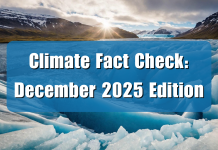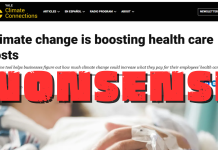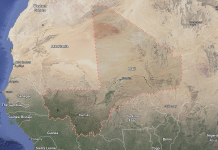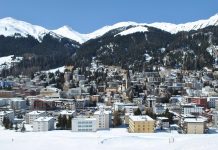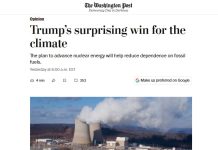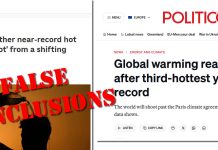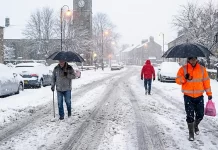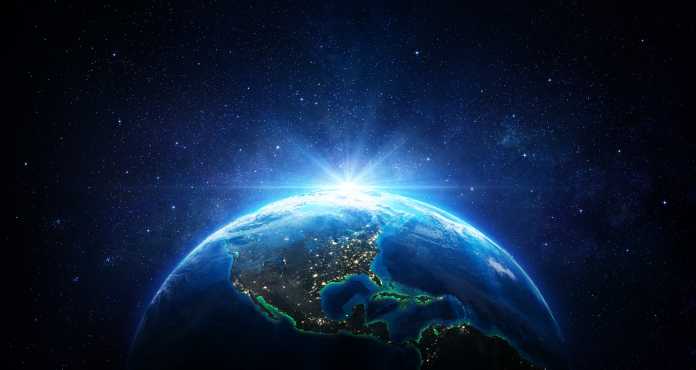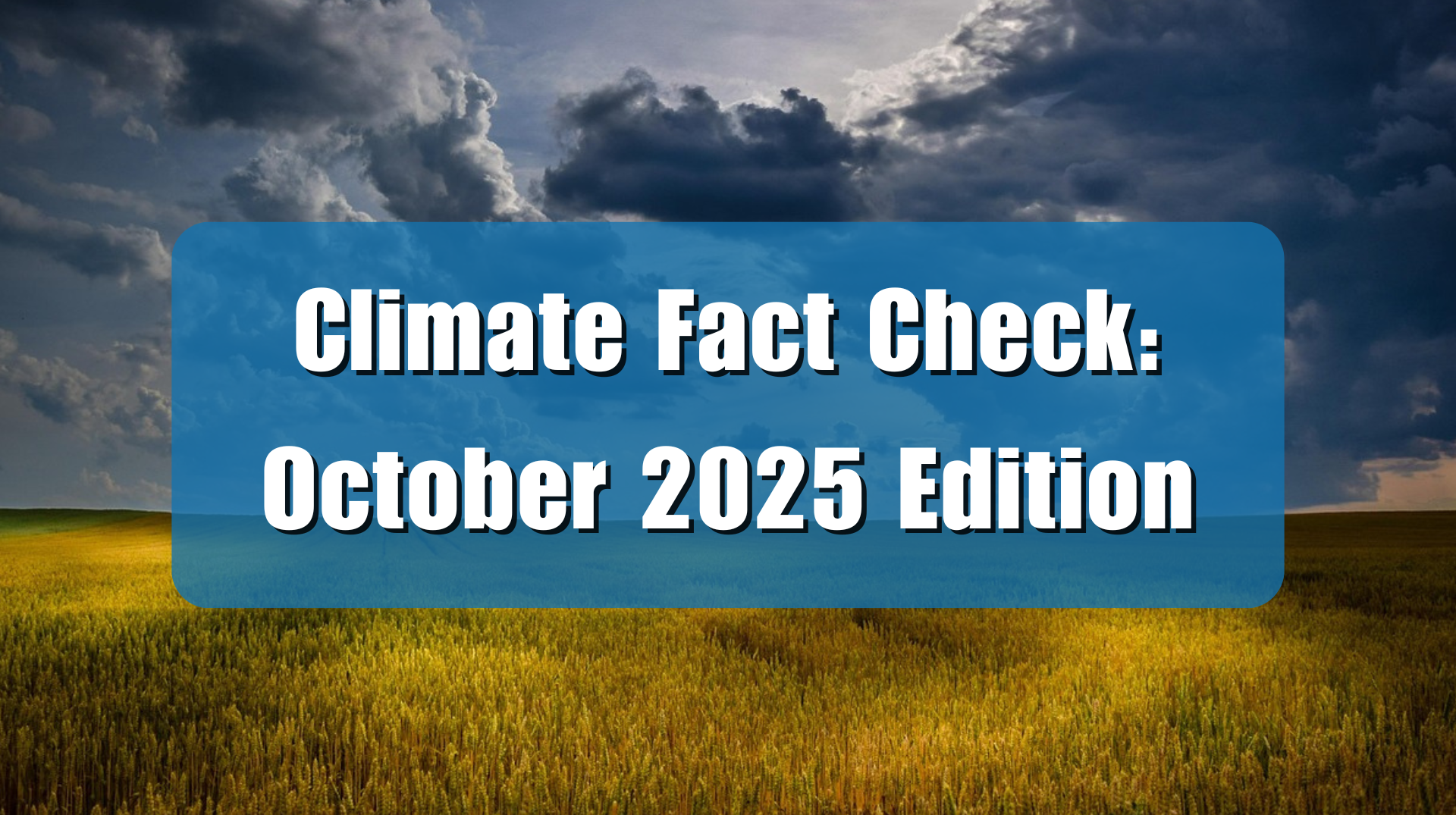A recent post at the BBC, titled “Seven proven ways to help the planet in 2025,” claims that the planet is threatened by global climate change due to human activity, and lists seven changes people can make in their lives save the planet by curbing emissions. The suggestions include: giving up meat; stopping flying; buying fewer clothes; reducing the carbon footprint of keeping a pet, if you keep one at all; using alternative home heating technologies; supporting fossil fuel divestment; and reducing plastic use. While none of these suggestions are novel, they are also not going to accomplish what the BBC claims, both because human activity is not threatening the planet via carbon dioxide emissions, and because many of these suggestions actually do not reduce emissions or are targeting areas that won’t have any measurable impact even if emissions reductions were desirable. For reasons of brevity, this post will only a address a few of the BBC’s suggestions in detail.
Right out of the gate, the BBC fearmongers with the claim that 2024 saw the first ever time that the “critical 1.5°C threshold was breached for a full year,” which according to the writers reinforces an “urgent need to rapidly cut global emissions.” As Climate Realism has discussed several times, including here, here, and here, the 1.5°C threshold is arbitrary and meaningless as a scientific measurement, it is merely a political tool. The planet has been much warmer in the past, and parts of the world have surpassed that measure for decades already with no catastrophic results. Now that the global threshold has been passed, when the media previously promised catastrophic events would follow, nothing has happened. There was no increase in extreme weather, and other forecasted tipping points have not materialized.
Even with the political threshold surpassed, the BBC says it is not too late, insisting there is still time to make the rapid emissions reductions necessary to save the planet. BBC admits that most of the high-level emissions reductions they want to see happen are beyond the scope of individuals, consigned to the realm of big-government policymaking, but says individual efforts still matter.
First on the list of suggestions is one Climate Realism has covered extensively before: “Eat a plant-based diet.” The BBC claims that “it’s widely agreed among the scientific community that to rescue the global climate from ever-warming temperatures, one of the most impactful ways our species can change its behaviour is to eat less meat.” They claim that vegetarian diets produce less carbon dioxide. Available real-world data refutes this claim.
For instance, regarding the emissions claims, Environmental Protection Agency data indicate that livestock actually represent just 3.9 percent of U.S. greenhouse gas emissions, compared to crop agriculture’s 10.2 percent. (See graphic below)
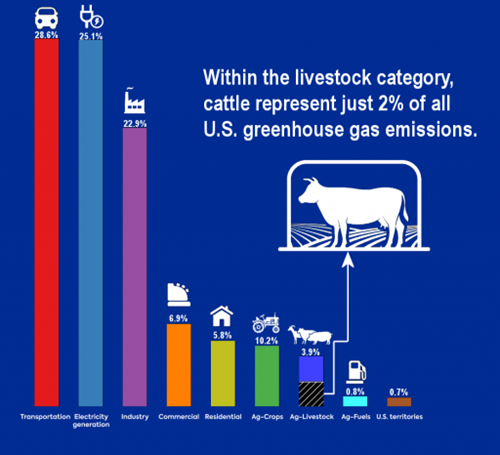
Notice also that agriculture in general make up a very low percentage overall of Americans’ contributions to greenhouse gas emissions.
Next, the BBC recommends people take public transportation, trains, and cars, instead of flying when they go on trips. As an added bonus, according to alarmists, “reducing flying will also likely mean you travel closer to home, reducing carbon even further.” If that wasn’t presumptuous enough, suggesting that people should not go on trips far from home, the BBC highlights an individual who biked from London to Sweden, which BBC acknowledges “cost more and took far longer than the plane would have,” as an exemplar for the rest of us. This is, again, totally impossible for most people who need to take a business trip or want to take a well-earned vacation. Most people do not have the luxury of time or funds to take extended trips.
The BBC also recommends buying fewer clothes, reducing plastic use, and reducing one’s carbon footprint of owning a pet by either eschewing pet ownership entirely or, hilariously, feeding them “sustainable” foods like fish and insects. With many global fish stocks being overfished, putting more pressure on global fisheries to feed pets seems environmentally questionable, at the very least. Concerning the suggestion to feed pets insects, Climate Realism has previously discussed the possible dangers of insect-based diets that climate alarmists have proposed.
Changing the way people heat their homes is the next recommendation from the BBC, but most of their suggestions are either expensive, or something that requires major civil infrastructure changes like using heat generated by sewers to warm homes. Obviously, that is not something the average person can actually do on his or her own, despite this allegedly being an article about individual efforts to reduce emissions. Heat pumps, predictably, are among the suggested replacements for traditional boilers, but heat pumps do not work well everywhere at all times. They lose efficiency and effectiveness in colder weather and some companies ironically recommend installing a gas furnace as backup to avoid spiking electricity bills. They are also an expensive option, once again pricing out people who are not well off.
The sixth suggestion from the BBC is leaning into the Environment, Social, and Governance (ESG) and fossil fuel divestment schemes for pensions and investment. The BBC points out that banks invest in fossil fuel companies, “and while the money you put in the bank doesn’t directly go towards this, experts say that it can make a difference to their social license.” The BBC is effectively saying that people should pressure banks and other institutions to quit supporting fossil fuel companies. All this would achieve is raising the cost of necessary fuels, which will greatly increase costs across the board, accomplishing nothing more than hurting average folks in the process. Countries that don’t care about emissions, meanwhile, like China, will continue to produce just as much and the benefit in the end will be nil, as discussed in the guest post “The SEC’s Risky Plan to Decarbonize the U.S. Financial Markets.”
Finally, the last suggestion is to reduce plastic use. While reducing waste in general is a good thing, single-use plastics have undoubtedly been a benefit for sanitation. In healthcare settings, single use plastics reduce the risk of contamination and help hospitals stay sterile environments. Plastic films used in grocery stores for food packaging reduce food waste by preventing spoilage of meats in particular. The BBC does not make much of an argument related to emissions in this section but rather trash and oil use in general, so we will not dig in too deep.
The bulk of the BBC’s arguments lean on emissions reductions, calling for actions that are unnecessary and more painful than helpful; human emissions of carbon dioxide are not endangering the planet or making Earth unlivable. The amount of carbon dioxide in the atmosphere has increased and decreased over the millennia, and human contributions today account for just 3.4 percent of annual emissions. The rest comes from natural sources. Crunching the numbers finds that human emissions of carbon dioxide may produce about 0.28 percent of the atmospheric gas related warming effect on Earth. That is hardly alarming. Since the alleged catastrophic impacts have not come to pass despite more than a hundred years of modest warming, accompanied by a steady increase in carbon dioxide, all of the efforts promoted by the BBC article –where they pertain to emissions—are more likely to reduce humans enjoyment of life, comfort, and freedom, than benefit them or the planet.
Looking at how many of the most prominent and elite climate scolds actually live their lives as opposed to what they preach for others, one suspects that they will keep eating their meat heavy four star meals, filling their room-sized walk-in closets with expensive haute couture clothes and shoes seasonally. They will continue to drive powerful fossil fuel cars while keeping an electric vehicle as a backup status symbol to trot out at green virtue signaling publicity events, and take their private jets to luxurious locations around the world, while paying pet sitters to feed their pure bred “animal companions” the most expensive, trendy pet food or even human cuisine. They will do all this while advising average working folk to buy second hand clothes, eat bugs, live in densely packed locations near rail lines, and not take vacation. After all, the elites know what’s best, the hoi polloi must sacrifice to save the planet.


